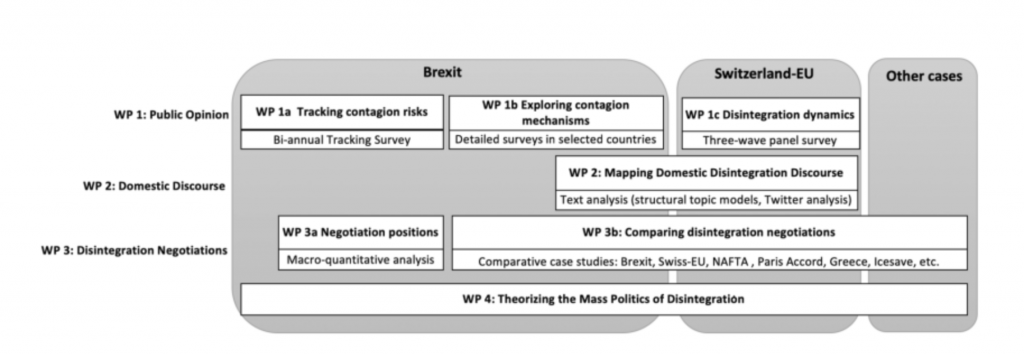DISINTEGRATION’s main objective is to generate a theory of voter-based disintegration on the basis of a broad, systematic, and comparative inquiry. Rather than examining why voters opt for disintegration, it takes one state’s mass-based withdrawal decision as the starting point and examines how it reverberates across the remaining member states. The project pays particular attention to the role of contagion effects, the dilemmas and incentives they generate for policymakers, and the dynamics they produce in the international arena. DISINTEGRATION’s main objective is thus to develop a theory of voter-based disintegration that helps us understand the transnational dynamics that unfold between governments, political elites and the mass public when one member state attempts to unilaterally withdraw from an international agreement on the basis of widespread popular support.
Empirically, DISINTEGRATION exploits the unique research opportunity that two ongoing mass-based disintegration processes offer: the Brexit process and an upcoming Swiss referendum aimed at terminating a Swiss-EU bilateral treaty. It undertakes large-scale multi-method data collection that exploits the two offered research opportunities. In terms of methodology, it combines public opinion research, text-as-data-methods, and comparative case studies.

DISINTEGRATION is organized in four work packages, which study the mass politics of disintegration at three levels of analysis: the individual level (WP 1), the domestic level (WP 2), and the international level (WP 3). A final work package (WP 4) builds on the project’s empirical findings and works towards developing a theory on the mass politics of disintegration.
Work package 1 on „Public Opinion“ studies when and how a country’s mass-based disintegration experience encourages or deters demands for disintegration in other countries. It tracks Brexit-related contagion risks, explores contagion mechanisms, and traces how disintegration-related opinions of the same respondent change over time during a disintegration referendum campaign.
Work package 2 on „Domestic Discourse“ analyses how the contagion effects of mass-based disintegration are transmitted through domestic elites and domestic discourse. To this end, DISINTEGRATION employs new advances in semi-automated text analysis (structural topic models) and an analysis of politicians‘ discourse on Twitter.
Turning to the international level, work package 3 on „Disintegration Negotiations“ examines how the remaining member states respond to one member state’s mass-based disintegration bid by analyzing national negotiating positions and engaging in a comparative study of different mass-based disintegration cases.
Finally, work package 4 „Theorizing the Mass Politics of Disintegration“ works towards building a theory of mass-based disintegration. It brings together the insights generated in work packages 1-3 with research on the politics of disintegration in the withdrawing member state.
This project is funded by the European Research Council (ERC) under the European Union’s Horizon 2020 research and innovation programme grant agreement No 817582 (ERC Consolidator Grant DISINTEGRATION). It has also benefitted from funding provided by the University of Zurich and the Stiftung für wissenschaftliche Forschung an der Universität Zürich.